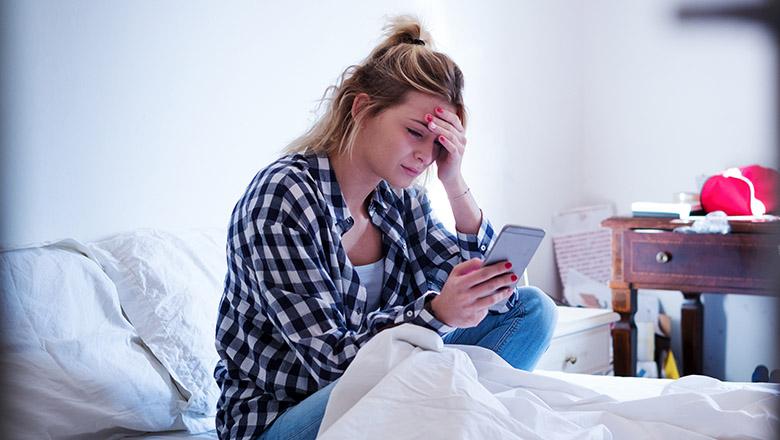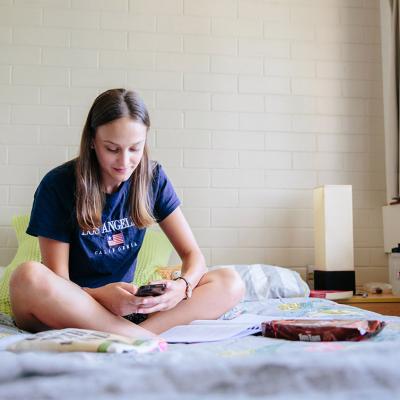Anxiety in teenagers is often a result of the constant changes they face and the pressures of impending adulthood. Feelings of anxiety can be normal, but when this worry and fear starts to affect their everyday life, it can cause more serious concern.
As a parent, the questions you need answers to may include “anxiety symptoms in teens – what should I be on the lookout for?” and “how do I go about helping my teenager with anxiety?”.
It can be difficult to recognise when anxiety in teens turns into a condition. It’s important to take the time to discuss the causes of anxiety with your teen and be aware of any changes in their behaviour that may indicate a more serious problem is at hand.
This article will provide information and practical advice to all parents dealing with teenage anxiety.
What is anxiety?
Anxiety can be described as an intense feeling of stress, worry and even fear. This may be in reaction to a situation (actual or perceived), memory, person or place. There are many triggers for anxiety and each person experiences it differently.
Everyone feels anxious at some point in their lives. It isn’t a positive feeling, but there are strategies that can help a person to cope with feelings of anxiety.
When anxiety paralyses a person from doing everyday activities for an extended period, a mental health professional should be consulted. Anxiety can be a serious condition, but with professional help, there are ways to treat it.
Below, we explain how to tell the difference between normal levels of anxiety, and anxiety that may be morphing into a condition for your teenager.

Anxiety symptoms in teens
Anxiety can be difficult to recognise in teenagers, especially since they can be private by nature and may not want to discuss their emotions. There are, however, a few more obvious signs of teenage anxiety that you can be on the lookout for, including:
- jittery gestures – unable to stand or sit still
- rapid breathing
- fixation on an idea or situation – continuously worrying about it aloud
- sweating
- upset stomach
- difficulty sleeping
- avoidance of new or difficult situations.
Signs of a teenage anxiety condition
Anxiety in everyday life will usually ease when the cause of the anxiety ends or is removed. For example, when exams finish, or a person has talked to someone they were nervous about meeting.
Anxiety can become a mental health condition if it’s ongoing – especially if your child begins to get anxious about perceived situations, rather than actual situations. For instance, if your teen starts to show signs of anxiety whenever there is a chance of a social situation arising, such as someone talking to them on the bus, or a group project at school. Your teen may gradually remove themselves from all possibilities of social interaction, becoming increasingly withdrawn. While this is an example of one type of anxiety (social anxiety), isolation can be a symptom of many types of anxiety conditions.
The following symptoms may indicate that your child has a more serious anxiety condition:
- isolation from friends and family
- insomnia
- panic attacks
- ongoing digestion issues or inability to eat due to nausea.
If your child displays symptoms of anxiety for over a week, it’s time to sit down and discuss what’s causing this anxiety and suggest the help of a professional.

How to help a teenager with anxiety
Anxiety in teens may be reasonably common, but it should never be overlooked. Having a conversation with your teenager about their anxiety can be challenging, but it’s important to bring it to the forefront so you can discover how to support them.
Parenting an anxious teenager
The best way to help your teenager with anxiety is to:
- find out what’s making them anxious, and
- talk through coping mechanisms and strategies for their anxiety.
Everyone handles anxiety differently, but here are a few coping strategies you can trial with your teenager:
- breathing and mindfulness exercises (there are lots of great apps to help with this)
- exercise
- journaling
- maintaining a healthy sleep schedule.
Help your teenager to be aware of what triggers their anxiety and assist them to use these coping mechanisms. Gradually, your teen may be able to recognise an anxiety-inducing situation early and use these exercises preventatively to lessen the impact of their anxiety.
Seeking professional help
If your teen’s anxiety appears to be ongoing, and you cannot attribute it to a specific event or obvious cause (such as exams, a school trip or upcoming performance), it may be time to seek the assistance of a mental health professional.
Is your child's anxiety preventing them from taking part in everyday life, such as going to school or socialising with friends? It’s definitely time to get help.
Check whether their school offers counselling, or if they can refer your teen to a local counsellor or psychologist. If the school doesn’t offer this service, a trip to your GP is a good place to start. They’ll be able to provide referrals and further information based on your teenager’s needs.
Is your teen anxious about exams and you’re unsure what to do to help? Find out how to support them by reading our top tips for helping your teen during an exam period.





